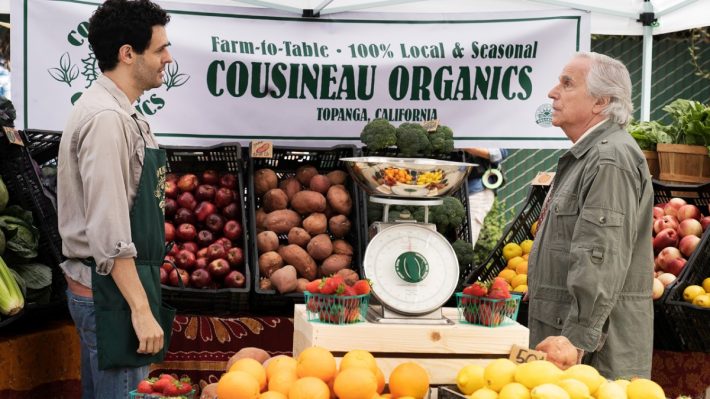Barry takes a little breather in “The Power of No,” an episode focused a bit more on the acting class than the criminal life. Of course, it’s only a little breather because the ball is rolling on two other stories, and we get the next steps for those as well.
Barry is struggling because he’s still replaying the story of his first kill in his mind, having to think about something he doesn’t want to think about, and feel things he doesn’t want to feel. Inspired by his performance last episode, the class decides to all tell traumatic origin stories, and to develop a show based around each of theirs. We get a lot of reaching into the past this episode.
Barry doesn’t want to reach into his past, so he begs off the Afghanistan story and convinces Gene to let him tell the story of when he first met Gene instead. Gene is, of course, immediately flattered– then we see him going through his desk and finding a photo of him, much younger, holding a baby. Gene’s turn to reach into the past: Still reeling from what happened to Janice, he decides life’s too short not to make connections, and he goes to visit his son, running a booth at a farmer’s market.
His son isn’t interested, though, and lays it out for him: Gene walked out on them a long time ago, has never tried to build a relationship with him, and is ultimately about himself. He doesn’t buy Gene’s excuse about his acting class: “That theater is a shrine to you.”
With that realization, Gene decides that Barry’s story needs to be about his first kill. Because it’s true– that is his origin story.
Meanwhile, Sally is frustrated with the weak, limited roles she’s gotten, and makes her monologue about that– Gene: “Your crisis is that you’re getting parts?”– until, simply by remaining wordless, Gene forces her to push through and tell her real story, one only hinted at at the end of last season: She was in an abusive marriage, but she finally worked up the courage to leave, moved to L.A. to make it for herself, and she’s rightfully proud of it, closing her monologue with “I’ll never be with a violent man again.” Gene: “Don’t you think that might be your story?” He really is a good teacher.
Barry’s breakthrough is interfering with his work, though. Hank gives him the information on the hit on Esther– we only get one scene with Hank, but it’s a delight, of course– but when the time comes, Barry starts hearing the voices in his head– the cheers of his soldier compatriots; Sally’s words– and the old dichotomy rears its head again. Barry is a bad man and a killer, but he wants to be a good man and an actor. He can’t bring himself to go through with the hit.
But then he gets himself caught trying to leave, and while he does escape (in a hail of bullets; his car doesn’t fare nearly as well), botching the hit presents a huge problem going forward, obviously– for Barry, for Hank, for the entire criminal… situation Barry has going on.
And, also, when he gets home, Fuches is waiting for him.
That’s the other ball that’s rolling: As soon as Fuches is released from the local jail, Loach is there waiting for him, having made the trip to Cleveland. Loach has already started to connect Barry and Fuches; he reveals that they found Fuches’ tooth at the Pazar crime scene; and Fuches’ bluster comes to an end when Loach reveals he doesn’t care about Pazar; he cares about his missing partner. “And I think this guy might’ve had something to do with it. He might be a cop killer. And if I find out that you’re even slightly involved with this fucking guy, like in any way, shape, or form, you’re going to prison. You got me?”
So of course Fuches flips on Barry. Barry’s smart enough not to say anything when they speak, but Fuches is confident he can get him to incriminate himself with time.
Being an actor is complicated.
STRAY BULLET POINTS
- Echoes of “Admit you’re evil” here. Barry: “Am I evil?” Hank: “Yes! You are like the most evil guy I know! Do I not tell you that enough?”
- Hank also tries to get Barry to shoot Esther with the bullet he received from the home office, then somehow retrieve the bullet so he can send it back. Barry rightly criticizes the feasibility of this plan.
- The actors go a little overboard with the improvisation on one story of divorce: “Now get these bodies out of here, you fucked-up serial killer.” “That’s not what happened!”
- That particularly actor-y self-absorption rears its head again when everyone is talking about how lucky Barry is that he had a tour of duty in Afghanistan to draw stories from. “Yes, Barry was blessed with being able to witness the atrocities of war…”
- But as Gene reminds them, “The rest of you, you’re going to find your sheep-fucker moment.”
- Describing Sally’s parts in her sizzle reel as “underwritten” is honestly kind of an understatement. “You really brought her to life… what was her name?” “The script just said ‘Wife’.”
- Great comedy moment of Gene announcing his presence at his son’s produce stand, stumbling and crashing into a display.
- The best detail in one of the posters, as Gene is walking around his theater reflecting on his son’s words: GENE COUSINEAU is TWELVE ANGRY MEN.
